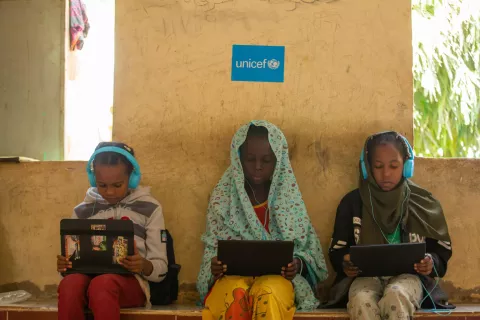Innovative cash transfer programme supports Syrian children with disabilities
The first-of-its kind programme provides bi-monthly cash support to families of children with disabilities

In the Syrian Arab Republic, children with disabilities face daily discrimination on top of the stress and violence that comes with the ongoing conflict. A new UNICEF cash transfer progamme is targeting these children and their families to provide much needed support.
ALEPPO, Syrian Arab Republic, 3 April 2017 – Two years ago, amid intensifying violence, ten-year-old Nasrallah and his family fled from their home in Idlib. “Fearing for our children’s lives, we had no choice but to flee to West Aleppo,” says Nasrallah’s father, Basel.
But even in their new home, Nasrallah is among the most marginalized groups of children in the Syrian Arab Republic because he has Down syndrome. Like all children with disabilities, he is confronted with daily discrimination, which is further exacerbated by the brutality of the ongoing conflict.
Thankfully for Nasrallah and his family, being part of the UNICEF cash support programme for children with disabilities is making life more bearable.

Innovative initiatives for children with disabilities
The first ever cash programme promoted by UNICEF in the Syrian Arab Republic provides children with opportunities to access services despite ongoing violence.
On a bi-monthly basis, the cash support programme provides US$40 per child to families of children with disabilities. Al Haram, a money transfer agency, wires the money directly to the families in the programme. The families are selected based on agreed criteria, which include complex disabilities such as autism, intellectual disability and cerebral palsy.
“With the help of our social workers, we identify these children and closely monitor the disbursement of funds. Social workers then conduct an in-depth assessment of the needs of these families, and follow them throughout the programme, helping them to find the responses they need for their children,” says Cristina Roccella, UNICEF Syria Chief of Social and Child Protection Programmes.
Thanks to the generous contribution of the German Government, the current programme aims to reach up to 4,250 children with disabilities in Aleppo in 2017, with a plan to scale up during the year in other parts of the country.
“Our vision is to help families respond rapidly to the needs of their children and provide them with the flexibility they need to fulfil their responsibilities as parents,” says Ms. Roccella.

Hidden talents unleashed
Nasrallah’s father, Basel, works as a professional tennis coach. After seeing a skill for tennis in young Nasrallah, Basel started training him at an early age.
“Children with disabilities are children with hidden talents,” he says.
Nasrallah has been practicing tennis with his father, and recently won the gold medal in a tennis tournament for children with disabilities.
“I want to become like Rafael Nadal,” says Nasrallah with pride in his eyes.
Strengthening resilience
The cash support programme is helping to reduce the impact that the brutal conflict has on the most vulnerable families by supplementing their income to improve their access to food and basic services such as education and health care.
Nasrallah suffers from a digestive condition which causes him to vomit and increases his risk of dehydration. Nasrallah requires a special diet, adding to the financial burden on the family.
“The cash support programme for children with disabilities helps us to get the right food for our son. We cannot afford it otherwise,” says Basel. “Nasrallah needs quality food to strengthen his body and allow him to pursue his dream of playing tennis.”
>> Support Syrian children affected by the crisis




